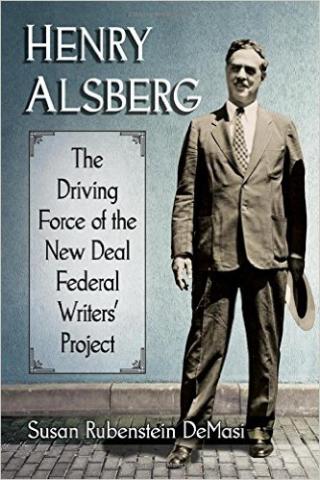Sometimes the most interesting characters of history slip through the cracks.
Such is certainly the case with Henry Alsberg - this native New Yorker faced immeasurable dangers as a war-time foreign correspondent; advocated for the release of international political prisoners; organized aid for Jewish refugees and pogrom survivors in Eastern Europe; and led the Federal Writers' Project of the WPA, whose legacy has benefited generations of genealogists.
Until recently, no one source told the gripping tale of Alsberg's life from start to finish.
Thankfully, Susan Rubenstein DeMasi took on the challenging task of sharing his story with us all. She'll be giving a book talk on her recently published work, Henry Alsberg: Driving Force of the New Deal Federal Writers' Project on October 19th at the NYG&B.
DeMasi's October 19th talk at the NYG&B - the event is free and open to the public (reservations required) - will focus on the method she used to write a full-length biography where one didn't exist before. Her multimedia presentation will outline the process of finding and weaving together the varied sources necessary to trace the arc of a person's life and tell their story in a compelling fashion.
In using Alsberg as an example, she will delve into several of the fascinating stories from his life - we thought we would share a few of those with you today.
Henry Alsberg was born into an affluent Jewish family of liberal intellectuals who lived on the Upper East Side of Manhattan. His passion for learning, writing, and travel drove him to succeed in a wide array of endeavors: Throughout his life, he worked as a lawyer, writer, theatrical producer, journalist and above all, a tireless crusader for human rights.
Foreign service and correspondence
After studying at Columbia and Harvard, Alsberg became a journalist, writing for The Nation and The New York Evening Post. In 1916, Alsberg traveled to Turkey, serving as personal secretary and press attaché to Abram Elkus, a prominent New York Lawyer with whom Alsberg had worked on Woodrow Wilson's campaign. Elkus had just been named the ambassador to the Ottoman Empire.
In his diplomatic service, Alsberg went well beyond the responsibilities of a clerk (his official title) or even a personal secretary or press attache (his unofficial titles).

He was tasked with overseeing the Embassy's aid efforts, which included attempts to protect the Armenians in the midst of a horrifying genocide, as well as Jews living in the Ottoman Empire, who many feared would soon suffer the same fate as their Armenian neighbors.
Alsberg managed the influx of funds for aid to these struggling people, allocating donations to help Jews in the empire emigrate, or at least save them from the abject poverty they faced. He also wrote several detailed and humanizing reports and, once home, Alsberg played a vital role in convincing the U.S. Government to pursue a separate peace with the Ottoman Empire, in hopes of resuming humanitarian activity, which had been paused due to U.S. involvement in the war.
After the war, Alsberg became more involved with Jewish causes, working with the Zionist Movement of America to establish a Jewish state and restore Jewish colonies in Palestine, which had been crippled by the war.
He continued reporting, growing into a capable and experienced international correspondent. He began a European tour on behalf of The Nation in 1919.
"Nobody loves the Jews in Prague, at the present time, but myself."
While in Paris, Alsberg met officials of the Jewish Joint Distribution Committee, who were searching for volunteers to travel to Central and Eastern Europe to provide aid to the poor and persecuted Jews of the region. He jumped at the opportunity.
First stationed in Prague, Alsberg used his many talents to make an enormous impact. Through his skilled journalistic-style writing, he was able to provide invaluable on-the-ground assessments of the deplorable conditions the Jews of Europe faced.

He continued working as a journalist as well, filing stories for The Nation, London Herald, and New York World. According to DeMasi, "while drawing an ethical line between his work as a journalist and his responsibilities as an aid worker, he used each activity to motivate and inform the other. Alsberg's reportage, copious through 1919, painted expressive and intricate pictures for Nation readers, describing a Europe 'laboring in the throes of recovery from war.' "
Building on his humanitarian experience in Turkey, Alsberg was also able to coordinate the distribution of funds sent by the JDC and other organizations, significantly increasing the efficiency of these charities.
He dove right into the communities he was helping, often smoothing over intra-local relationships and working to improve cooperation. He also focused on providing relief for the huge number of Jewish refugees struggling to find a home in the post-war instability.
Only the tip of the iceberg
Amazingly, Alsberg's work in journalism, foreign service, and international humanitarian aid are only several of the many enthralling tales of his life.
His travels eventually brought him to Russia, where he advocated for the release of political prisoners. Upon returning to the United States, he became involved in the New York theater scene, and eventually headed the well-known Federal Writers' Project of the WPA, for which he has earned the most notoriety.
If you would like to hear more about the fascinating life of Henry Alsberg, Susan Rubenstein DeMasi will be speaking at the New York Genealogical and Biographical Society on October 19th at 6:00pm.
To reserve your seat, please email rsvp@nygbs.org.
For more details, see our calendar.
